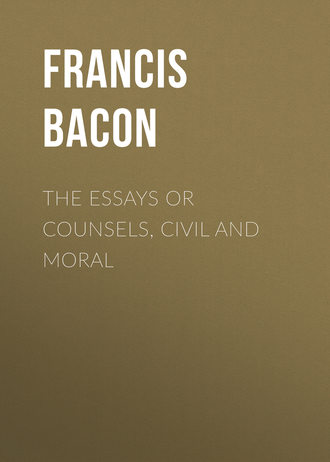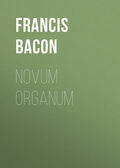
Фрэнсис Бэкон
The Essays or Counsels, Civil and Moral
Of Gardens
GOD Almighty first planted a garden. And indeed it is the purest of human pleasures. It is the greatest refreshment to the spirits of man; without which, buildings and palaces are but gross handiworks; and a man shall ever see, that when ages grow to civility and elegancy, men come to build stately sooner than to garden finely; as if gardening were the greater perfection. I do hold it, in the royal ordering of gardens, there ought to be gardens, for all the months in the year; in which severally things of beauty may be then in season. For December, and January, and the latter part of November, you must take such things as are green all winter: holly; ivy; bays; juniper; cypress-trees; yew; pine-apple-trees; fir-trees; rosemary; lavender; periwinkle, the white, the purple, and the blue; germander; flags; orange-trees; lemon-trees; and myrtles, if they be stoved; and sweet marjoram, warm set. There followeth, for the latter part of January and February, the mezereon-tree, which then blossoms; crocus vernus, both the yellow and the grey; primroses, anemones; the early tulippa; hyacinthus orientalis; chamairis; fritellaria. For March, there come violets, specially the single blue, which are the earliest; the yellow daffodil; the daisy; the almond-tree in blossom; the peach-tree in blossom; the cornelian-tree in blossom; sweet-briar. In April follow the double white violet; the wallflower; the stock-gilliflower; the cowslip; flowerdelices, and lilies of all natures; rosemary-flowers; the tulippa; the double peony; the pale daffodil; the French honeysuckle; the cherry-tree in blossom; the damson and plum-trees in blossom; the white thorn in leaf; the lilac-tree. In May and June come pinks of all sorts, specially the blushpink; roses of all kinds, except the musk, which comes later; honeysuckles; strawberries; bugloss; columbine; the French marigold, flos Africanus; cherry-tree in fruit; ribes; figs in fruit; rasps; vineflowers; lavender in flowers; the sweet satyrian, with the white flower; herba muscaria; lilium convallium; the apple-tree in blossom. In July come gilliflowers of all varieties; musk-roses; the lime-tree in blossom; early pears and plums in fruit; jennetings, codlins. In August come plums of all sorts in fruit; pears; apricocks; berberries; filberds; musk-melons; monks-hoods, of all colors. In September come grapes; apples; poppies of all colors; peaches; melocotones; nectarines; cornelians; wardens; quinces. In October and the beginning of November come services; medlars; bullaces; roses cut or removed to come late; hollyhocks; and such like. These particulars are for the climate of London; but my meaning is perceived, that you may have ver perpetuum, as the place affords.
And because the breath of flowers is far sweeter in the air (where it comes and goes like the warbling of music) than in the hand, therefore nothing is more fit for that delight, than to know what be the flowers and plants that do best perfume the air. Roses, damask and red, are fast flowers of their smells; so that you may walk by a whole row of them, and find nothing of their sweetness; yea though it be in a morning's dew. Bays likewise yield no smell as they grow. Rosemary little; nor sweet marjoram. That which above all others yields the sweetest smell in the air is the violet, specially the white double violet, which comes twice a year; about the middle of April, and about Bartholomew-tide. Next to that is the musk-rose. Then the strawberry-leaves dying, which yield a most excellent cordial smell. Then the flower of vines; it is a little dust, like the dust of a bent, which grows upon the cluster in the first coming forth. Then sweet-briar. Then wall-flowers, which are very delightful to be set under a parlor or lower chamber window. Then pinks and gilliflowers, especially the matted pink and clove gilliflower. Then the flowers of the lime-tree. Then the honeysuckles, so they be somewhat afar off. Of beanflowers I speak not, because they are field flowers. But those which perfume the air most delightfully, not passed by as the rest, but being trodden upon and crushed, are three; that is, burnet, wildthyme, and watermints. Therefore you are to set whole alleys of them, to have the pleasure when you walk or tread.
For gardens (speaking of those which are indeed princelike, as we have done of buildings), the contents ought not well to be under thirty acres of ground; and to be divided into three parts; a green in the entrance; a heath or desert in the going forth; and the main garden in the midst; besides alleys on both sides. And I like well that four acres of ground be assigned to the green; six to the heath; four and four to either side; and twelve to the main garden. The green hath two pleasures: the one, because nothing is more pleasant to the eye than green grass kept finely shorn; the other, because it will give you a fair alley in the midst, by which you may go in front upon a stately hedge, which is to enclose the garden. But because the alley will be long, and, in great heat of the year or day, you ought not to buy the shade in the garden, by going in the sun through the green, therefore you are, of either side the green, to plant a covert alley upon carpenter's work, about twelve foot in height, by which you may go in shade into the garden. As for the making of knots or figures, with divers colored earths, that they may lie under the windows of the house on that side which the garden stands, they be but toys; you may see as good sights, many times, in tarts. The garden is best to be square, encompassed on all the four sides with a stately arched hedge. The arches to be upon pillars of carpenter's work, of some ten foot high, and six foot broad; and the spaces between of the same dimension with the breadth of the arch. Over the arches let there be an entire hedge of some four foot high, framed also upon carpenter's work; and upon the upper hedge, over every arch, a little turret, with a belly, enough to receive a cage of birds: and over every space between the arches some other little figure, with broad plates of round colored glass gilt, for the sun to play upon. But this hedge I intend to be raised upon a bank, not steep, but gently slope, of some six foot, set all with flowers. Also I understand, that this square of the garden, should not be the whole breadth of the ground, but to leave on either side, ground enough for diversity of side alleys; unto which the two covert alleys of the green, may deliver you. But there must be no alleys with hedges, at either end of this great enclosure; not at the hither end, for letting your prospect upon this fair hedge from the green; nor at the further end, for letting your prospect from the hedge, through the arches upon the heath.
For the ordering of the ground, within the great hedge, I leave it to variety of device; advising nevertheless, that whatsoever form you cast it into, first, it be not too busy, or full of work. Wherein I, for my part, do not like images cut out in juniper or other garden stuff; they be for children. Little low hedges, round, like welts, with some pretty pyramids, I like well; and in some places, fair columns upon frames of carpenter's work. I would also have the alleys, spacious and fair. You may have closer alleys, upon the side grounds, but none in the main garden. I wish also, in the very middle, a fair mount, with three ascents, and alleys, enough for four to walk abreast; which I would have to be perfect circles, without any bulwarks or embossments; and the whole mount to be thirty foot high; and some fine banqueting-house, with some chimneys neatly cast, and without too much glass.
For fountains, they are a great beauty and refreshment; but pools mar all, and make the garden unwholesome, and full of flies and frogs. Fountains I intend to be of two natures: the one that sprinkleth or spouteth water; the other a fair receipt of water, of some thirty or forty foot square, but without fish, or slime, or mud. For the first, the ornaments of images gilt, or of marble, which are in use, do well: but the main matter is so to convey the water, as it never stay, either in the bowls or in the cistern; that the water be never by rest discolored, green or red or the like; or gather any mossiness or putrefaction. Besides that, it is to be cleansed every day by the hand. Also some steps up to it, and some fine pavement about it, doth well. As for the other kind of fountain, which we may call a bathing pool, it may admit much curiosity and beauty; wherewith we will not trouble ourselves: as, that the bottom be finely paved, and with images; the sides likewise; and withal embellished with colored glass, and such things of lustre; encompassed also with fine rails of low statuas. But the main point is the same which we mentioned in the former kind of fountain; which is, that the water be in perpetual motion, fed by a water higher than the pool, and delivered into it by fair spouts, and then discharged away under ground, by some equality of bores, that it stay little. And for fine devices, of arching water without spilling, and making it rise in several forms (of feathers, drinking glasses, canopies, and the like), they be pretty things to look on, but nothing to health and sweetness.
For the heath, which was the third part of our plot, I wish it to be framed, as much as may be, to a natural wildness. Trees I would have none in it, but some thickets made only of sweet-briar and honeysuckle, and some wild vine amongst; and the ground set with violets, strawberries, and primroses. For these are sweet, and prosper in the shade. And these to be in the heath, here and there, not in any order. I like also little heaps, in the nature of mole-hills (such as are in wild heaths), to be set, some with wild thyme; some with pinks; some with germander, that gives a good flower to the eye; some with periwinkle; some with violets; some with strawberries; some with cowslips; some with daisies; some with red roses; some with lilium convallium; some with sweet-williams red; some with bear's-foot: and the like low flowers, being withal sweet and sightly. Part of which heaps, are to be with standards of little bushes pricked upon their top, and part without. The standards to be roses; juniper; holly; berberries (but here and there, because of the smell of their blossoms); red currants; gooseberries; rosemary; bays; sweetbriar; and such like. But these standards to be kept with cutting, that they grow not out of course.
For the side grounds, you are to fill them with variety of alleys, private, to give a full shade, some of them, wheresoever the sun be. You are to frame some of them, likewise, for shelter, that when the wind blows sharp you may walk as in a gallery. And those alleys must be likewise hedged at both ends, to keep out the wind; and these closer alleys must be ever finely gravelled, and no grass, because of going wet. In many of these alleys, likewise, you are to set fruit-trees of all sorts; as well upon the walls, as in ranges. And this would be generally observed, that the borders wherein you plant your fruit-trees, be fair and large, and low, and not steep; and set with fine flowers, but thin and sparingly, lest they deceive the trees. At the end of both the side grounds, I would have a mount of some pretty height, leaving the wall of the enclosure breast high, to look abroad into the fields.
For the main garden, I do not deny, but there should be some fair alleys ranged on both sides, with fruit-trees; and some pretty tufts of fruit-trees, and arbors with seats, set in some decent order; but these to be by no means set too thick; but to leave the main garden so as it be not close, but the air open and free. For as for shade, I would have you rest upon the alleys of the side grounds, there to walk, if you be disposed, in the heat of the year or day; but to make account, that the main garden is for the more temperate parts of the year; and in the heat of summer, for the morning and the evening, or overcast days.
For aviaries, I like them not, except they be of that largeness as they may be turfed, and have living plants and bushes set in them; that the birds may have more scope, and natural nesting, and that no foulness appear in the floor of the aviary. So I have made a platform of a princely garden, partly by precept, partly by drawing, not a model, but some general lines of it; and in this I have spared for no cost. But it is nothing for great princes, that for the most part taking advice with workmen, with no less cost set their things together; and sometimes add statuas and such things for state and magnificence, but nothing to the true pleasure of a garden.
Of Negotiating
IT IS generally better to deal by speech than by letter; and by the mediation of a third than by a man's self. Letters are good, when a man would draw an answer by letter back again; or when it may serve for a man's justification afterwards to produce his own letter; or where it may be danger to be interrupted, or heard by pieces. To deal in person is good, when a man's face breedeth regard, as commonly with inferiors; or in tender cases, where a man's eye, upon the countenance of him with whom he speaketh, may give him a direction how far to go; and generally, where a man will reserve to himself liberty, either to disavow or to expound. In choice of instruments, it is better to choose men of a plainer sort, that are like to do that, that is committed to them, and to report back again faithfully the success, than those that are cunning, to contrive, out of other men's business, somewhat to grace themselves, and will help the matter in report for satisfaction's sake. Use also such persons as affect the business, wherein they are employed; for that quickeneth much; and such, as are fit for the matter; as bold men for expostulation, fair-spoken men for persuasion, crafty men for inquiry and observation, froward, and absurd men, for business that doth not well bear out itself. Use also such as have been lucky, and prevailed before, in things wherein you have employed them; for that breeds confidence, and they will strive to maintain their prescription. It is better to sound a person, with whom one deals afar off, than to fall upon the point at first; except you mean to surprise him by some short question. It is better dealing with men in appetite, than with those that are where they would be. If a man deal with another upon conditions, the start or first performance is all; which a man cannot reasonably demand, except either the nature of the thing be such, which must go before; or else a man can persuade the other party, that he shall still need him in some other thing; or else that he be counted the honester man. All practice is to discover, or to work. Men discover themselves in trust, in passion, at unawares, and of necessity, when they would have somewhat done, and cannot find an apt pretext. If you would work any man, you must either know his nature and fashions, and so lead him; or his ends, and so persuade him; or his weakness and disadvantages, and so awe him; or those that have interest in him, and so govern him. In dealing with cunning persons, we must ever consider their ends, to interpret their speeches; and it is good to say little to them, and that which they least look for. In all negotiations of difficulty, a man may not look to sow and reap at once; but must prepare business, and so ripen it by degrees.
Of Followers And Friends
COSTLY followers are not to be liked; lest while a man maketh his train longer, he make his wings shorter. I reckon to be costly, not them alone which charge the purse, but which are wearisome, and importune in suits. Ordinary followers ought to challenge no higher conditions, than countenance, recommendation, and protection from wrongs. Factious followers are worse to be liked, which follow not upon affection to him, with whom they range themselves, but upon discontentment conceived against some other; whereupon commonly ensueth that ill intelligence, that we many times see between great personages. Likewise glorious followers, who make themselves as trumpets of the commendation of those they follow, are full of inconvenience; for they taint business through want of secrecy; and they export honor from a man, and make him a return in envy. There is a kind of followers likewise, which are dangerous, being indeed espials; which inquire the secrets of the house, and bear tales of them, to others. Yet such men, many times, are in great favor; for they are officious, and commonly exchange tales. The following by certain estates of men, answerable to that, which a great person himself professeth (as of soldiers, to him that hath been employed in the wars, and the like), hath ever been a thing civil, and well taken, even in monarchies; so it be without too much pomp or popularity. But the most honorable kind of following, is to be followed as one, that apprehendeth to advance virtue, and desert, in all sorts of persons. And yet, where there is no eminent odds in sufficiency, it is better to take with the more passable, than with the more able. And besides, to speak truth, in base times, active men are of more use than virtuous. It is true that in government, it is good to use men of one rank equally: for to countenance some extraordinarily, is to make them insolent, and the rest discontent; because they may claim a due. But contrariwise, in favor, to use men with much difference and election is good; for it maketh the persons preferred more thankful, and the rest more officious: because all is of favor. It is good discretion, not to make too much of any man at the first; because one cannot hold out that proportion. To be governed (as we call it) by one is not safe; for it shows softness, and gives a freedom, to scandal and disreputation; for those, that would not censure or speak ill of a man immediately, will talk more boldly of those that are so great with them, and thereby wound their honor. Yet to be distracted with many is worse; for it makes men to be of the last impression, and full of change. To take advice of some few friends, is ever honorable; for lookers-on many times see more than gamesters; and the vale best discovereth the hill. There is little friendship in the world, and least of all between equals, which was wont to be magnified. That that is, is between superior and inferior, whose fortunes may comprehend the one the other.
Of Suitors
MANY ill matters and projects are undertaken; and private suits do putrefy the public good. Many good matters, are undertaken with bad minds; I mean not only corrupt minds, but crafty minds, that intend not performance. Some embrace suits, which never mean to deal effectually in them; but if they see there may be life in the matter, by some other mean, they will be content to win a thank, or take a second reward, or at least to make use, in the meantime, of the suitor's hopes. Some take hold of suits, only for an occasion to cross some other; or to make an information, whereof they could not otherwise have apt pretext; without care what become of the suit, when that turn is served; or, generally, to make other men's business a kind of entertainment, to bring in their own. Nay, some undertake suits, with a full purpose to let them fall; to the end to gratify the adverse party, or competitor. Surely there is in some sort a right in every suit; either a right of equity, if it be a suit of controversy; or a right of desert, if it be a suit of petition. If affection lead a man to favor the wrong side in justice, let him rather use his countenance to compound the matter, than to carry it. If affection lead a man to favor the less worthy in desert, let him do it, without depraving or disabling the better deserver. In suits which a man doth not well understand, it is good to refer them to some friend of trust and judgment, that may report, whether he may deal in them with honor: but let him choose well his referendaries, for else he may be led by the nose. Suitors are so distasted with delays and abuses, that plain dealing, in denying to deal in suits at first, and reporting the success barely, and in challenging no more thanks than one hath deserved, is grown not only honorable, but also gracious. In suits of favor, the first coming ought to take little place: so far forth, consideration may be had of his trust, that if intelligence of the matter could not otherwise have been had, but by him, advantage be not taken of the note, but the party left to his other means; and in some sort recompensed, for his discovery. To be ignorant of the value of a suit, is simplicity; as well as to be ignorant of the right thereof, is want of conscience. Secrecy in suits, is a great mean of obtaining; for voicing them to be in forwardness, may discourage some kind of suitors, but doth quicken and awake others. But timing of the suit is the principal. Timing, I say, not only in respect of the person that should grant it, but in respect of those, which are like to cross it. Let a man, in the choice of his mean, rather choose the fittest mean, than the greatest mean; and rather them that deal in certain things, than those that are general. The reparation of a denial, is sometimes equal to the first grant; if a man show himself neither dejected nor discontented. Iniquum petas ut aequum feras is a good rule, where a man hath strength of favor: but otherwise, a man were better rise in his suit; for he, that would have ventured at first to have lost the suitor, will not in the conclusion lose both the suitor, and his own former favor. Nothing is thought so easy a request to a great person, as his letter; and yet, if it be not in a good cause, it is so much out of his reputation. There are no worse instruments, than these general contrivers of suits; for they are but a kind of poison, and infection, to public proceedings.







